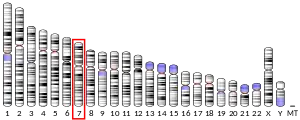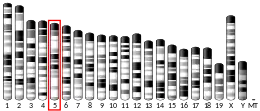GAL3ST4
Galactose-3-O-sulfotransferase 4 is an enzyme that in humans is encoded by the GAL3ST4 gene.[5][6]
This gene encodes a member of the galactose-3-O-sulfotransferase protein family. The product of this gene catalyzes sulfonation by transferring a sulfate to the C-3' position of galactose residues in O-linked glycoproteins. This enzyme is highly specific for core 1 structures, with asialofetuin, Gal-beta-1,3-GalNAc and Gal-beta-1,3 (GlcNAc-beta-1,6)GalNAc being good substrates.[6]
Mutations
Pectus Excavatum, the most common deformity of the chest wall, is believed to have a genetic component. The condition is believed to be passed either dominantly or recessively by a gene of unknown identity. A study performed in 2012 by Wu et al.[7] states that pectus excavatum displays dominant inheritance via a mutation in GAL3ST4. The study proposes mutation g.chr7: 99764688G>A affects the first exon of GAL3ST4 resulting in tryptophan replacing arginine at residue 11 of the encoded protein. This mutation is highly likely to disrupt the normal function of the encoded protein. GAL3ST4 is typically responsible for catalyzing “the C-3 sulfation of galactoses in O-linked glycoproteins”.[8] Mutation of this gene results in alterations of the typical sulfation pattern of glycan chains, which will alter the physiologic functions of various glycoproteins. For normal development of cartilage and bone to occur, sulfation of proteoglycans must occur. Mutations of proteins responsible for other aspects of sulfation and sulfatases have been linked to several mutations affecting the skeleton. Through the evaluation of several participants with pectus excavatum, Wu et al. determined mutation of GAL3ST4 is most likely responsible for the dominant inheritance pattern of pectus excavatum through alterations of the encoded proteins.
References
- GRCh38: Ensembl release 89: ENSG00000197093 - Ensembl, May 2017
- GRCm38: Ensembl release 89: ENSMUSG00000075593 - Ensembl, May 2017
- "Human PubMed Reference:". National Center for Biotechnology Information, U.S. National Library of Medicine.
- "Mouse PubMed Reference:". National Center for Biotechnology Information, U.S. National Library of Medicine.
- Seko A, Hara-Kuge S, Yamashita K (Jul 2001). "Molecular cloning and characterization of a novel human galactose 3-O-sulfotransferase that transfers sulfate to gal beta 1-->3galNAc residue in O-glycans". J Biol Chem. 276 (28): 25697–704. doi:10.1074/jbc.M101558200. PMID 11333265.
- "Entrez Gene: GAL3ST4 galactose-3-O-sulfotransferase 4".
- Wu, S., Sun, X., Zhu, W., Huang, Y., Mou, L., Liu, M., ... & Wang, Z. (2012). Evidence for GAL3ST4 mutation as the potential cause of pectus excavatum. Cell research, 22(12), 1712-1715.
- Seko A, Hara-Kuge S, Yamashita K. Molecular cloning and characterization of a novel human galactose 3-O-sulfotransferase that transfers sulfate to Galβ1→3GalNAc residue in O-glycans. J Biol Chem. 2001;276:25697–25704.
Further reading
- Maruyama K, Sugano S (1994). "Oligo-capping: a simple method to replace the cap structure of eukaryotic mRNAs with oligoribonucleotides". Gene. 138 (1–2): 171–4. doi:10.1016/0378-1119(94)90802-8. PMID 8125298.
- Suzuki Y, Yoshitomo-Nakagawa K, Maruyama K, et al. (1997). "Construction and characterization of a full length-enriched and a 5'-end-enriched cDNA library". Gene. 200 (1–2): 149–56. doi:10.1016/S0378-1119(97)00411-3. PMID 9373149.
- Strausberg RL, Feingold EA, Grouse LH, et al. (2003). "Generation and initial analysis of more than 15,000 full-length human and mouse cDNA sequences". Proc. Natl. Acad. Sci. U.S.A. 99 (26): 16899–903. doi:10.1073/pnas.242603899. PMC 139241. PMID 12477932.
- Scherer SW, Cheung J, MacDonald JR, et al. (2003). "Human chromosome 7: DNA sequence and biology". Science. 300 (5620): 767–72. doi:10.1126/science.1083423. PMC 2882961. PMID 12690205.
- Chandrasekaran EV, Lakhaman SS, Chawda R, et al. (2004). "Identification of physiologically relevant substrates for cloned Gal: 3-O-sulfotransferases (Gal3STs): distinct high affinity of Gal3ST-2 and LS180 sulfotransferase for the globo H backbone, Gal3ST-3 for N-glycan multiterminal Galbeta1, 4GlcNAcbeta units and 6-sulfoGalbeta1, 4GlcNAcbeta, and Gal3ST-4 for the mucin core-2 trisaccharide". J. Biol. Chem. 279 (11): 10032–41. doi:10.1074/jbc.M311989200. PMID 14701868.
- Ota T, Suzuki Y, Nishikawa T, et al. (2004). "Complete sequencing and characterization of 21,243 full-length human cDNAs". Nat. Genet. 36 (1): 40–5. doi:10.1038/ng1285. PMID 14702039.
- Gerhard DS, Wagner L, Feingold EA, et al. (2004). "The status, quality, and expansion of the NIH full-length cDNA project: the Mammalian Gene Collection (MGC)". Genome Res. 14 (10B): 2121–7. doi:10.1101/gr.2596504. PMC 528928. PMID 15489334.
- Wan D, Gong Y, Qin W, et al. (2004). "Large-scale cDNA transfection screening for genes related to cancer development and progression". Proc. Natl. Acad. Sci. U.S.A. 101 (44): 15724–9. doi:10.1073/pnas.0404089101. PMC 524842. PMID 15498874.



